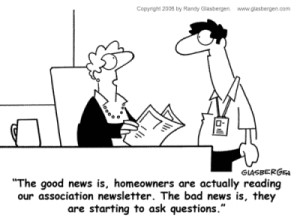 Effective communication requires a combination of open Meetings, frequent Newsletters, an updated Website, Board Correspondence and Direct Owner Contact.
Effective communication requires a combination of open Meetings, frequent Newsletters, an updated Website, Board Correspondence and Direct Owner Contact.
Corresponding with Owners
Primary methods for Association communication with members are as follows:
- Newsletters & bulletins
Board & Committee meeting Notices with agendas
First & second Annual Meeting notices (January/February & March)
Proposed and final annual budgets (November)
Annual audited financial report (April)
Board letters to specific owners (as required)
Board/Homeowner Correspondence
Prompt Board response to owner correspondence (emails, letters, etc.) is very important, enabling owners to feel that their input and concerns are valued.
Florida Statute 718.112(2)(a)2 says that "when a unit owner files a written inquiry by certified mail with the board of administration, the board shall respond in writing to the unit owner within 30 days of receipt of the inquiry. The board’s response shall either give a substantive response to the inquirer, notify the inquirer that a legal opinion has been requested, or notify the inquirer that advice has been requested from the division."
If the board requests advice from the division, the board must respond within 10 days of its receipt of the advice. If a legal opinion is requested, the board has 60 days to respond.
Jupiter Bay Newsletters
 Regular, as a minimum quarterly, and timely Newsletters provide another important official Board communication tool. Newsletters should clearly communicate factual information to help owners understand the progress and accomplishments of the Association. They should not be used to promote a particular opinion, agenda, or political position.
Regular, as a minimum quarterly, and timely Newsletters provide another important official Board communication tool. Newsletters should clearly communicate factual information to help owners understand the progress and accomplishments of the Association. They should not be used to promote a particular opinion, agenda, or political position.
Following are recommended Newsletter contents:
|
Right of Owners to Assemble
Florida Statute 718.123 grants the right of owners to peaceably assemble:
(1). All common elements, common areas, and recreational facilities serving any condominium shall be available to unit owners in the condominium or condominiums served thereby and their invited guests for the use intended for such common elements, common areas, and recreational facilities, subject to the provisions of s. 718.106(4) (See below). The entity or entities responsible for the operation of the common elements, common areas, and recreational facilities may adopt reasonable rules and regulations pertaining to the use of such common elements, common areas, and recreational facilities. No entity or entities shall unreasonably restrict any unit owner’s right to peaceably assemble or right to invite public officers or candidates for public office to appear and speak in common elements, common areas, and recreational facilities.
(2). Any owner prevented from exercising rights guaranteed by subsection (1) may bring an action in the appropriate court of the county in which the alleged infringement occurred, and, upon favorable adjudication, the court shall enjoin the enforcement of any provision contained in any condominium document or rule which operates to deprive the owner of such rights.
Jupiter Bay Website
The Jupiter Bay Condominium Association website provides valuable information regarding the Association and community activities.
Its purpose is "to provide condominium owners helpful information to keep them informed of Association activities, enhance community spirit, increase transparency, and promote inclusiveness of all owners. The content of the website is strictly controlled by the Association. The website will not contain information that violates generally accepted privacy standards, is political in nature, is offensive to individuals or organizations."
The website needs to comply with Florida statute 718.111(12)(g) requirements and be reviewed and updated regularly as it is an important communication source for unit owners. Please reference the "Governance" page of this website for additional information on required website content.
Board Member Email Communications
A July 1st 2014 change in Florida’s condominium statutes involved board member email communications. Statute 718.112(2)(c), which addresses board of administration meetings, now reads “Meetings of the board of administration at which a quorum of the members is present are open to all unit owners. Members of the board of administration may use e-mail as a means of communication but may not cast a vote on an association matter via e-mail”.
Although this change acknowledges and authorizes board member communication via e-mail, it leaves a number of unanswered questions:
- Exactly what actions can board members take via email, and where do the statutes draw the line short of “casting a vote on an association matter”?
- Can emails be used for obtaining “unanimous written consent” on official board actions?
- Are emails between board members considered “official records” of the association? If so, this opens a multitude of questions, including how they should be retained, whether they can be obtained/viewed by owners, etc.
Item #15 of Florida Statute 718.111(12)(a) includes as Official Records “All other records of the association not specifically included in the foregoing which are related to the operation of the association.” Management office and Board member emails are certainly used in the “operation of the association”. Therefore board member emails may be considered “official records” making them available for viewing by homeowners who request them. The only exception would be for those emails protected by the lawyer-client privilege or containing certain confidential personnel information.
Regarding the second question, a Palm Beach Post reader asked the Poliakoff attorneys, in a 7/27/14 posting, whether “the board could use a unanimous written consent, executed in counterparts, to meet the requirements for a traditional meeting?” Gary & Ryan Poliakoff responded that:
“Not all attorneys agree. Most attorneys have said that, unless expressly barred otherwise by the governing documents, unanimous written consents may be used for official board actions. We do know of some attorneys who feel that the governing documents must expressly provide for action by unanimous written consent, but that seems to be a minority opinion. It’s also important to note that some decisions — such as considering a special assessment or passing a rule regarding unit use in a condominium — require written notice to owners, and for those decisions it is doubtful that a unanimous written consent would suffice.”
Jupiter Bay’s governing condominium documents make no mention of email usage and do not provide for unanimous written consent as an allowed means of taking board actions. On the other hand, they do not expressly bar the use of this method. This leaves us with a number of unanswered questions for future statute amendments, or the Association's attorneys, to address.
Owner's Email Address Usage
The email address that you provide becomes part of the Association's "Roster of Unit Owners", and its use is regulated by the Official Records section (12) of Florida Statute 718.111.
Paragraph (a)7 of this section says that the Association shall maintain: "A current roster of all unit owners and their mailing addresses, unit identifications, voting certifications, and, if known, telephone numbers. The association shall also maintain the electronic mailing addresses and facsimile numbers of unit owners consenting to receive notice by electronic transmission. The electronic mailing addresses and facsimile numbers are not accessible to unit owners if consent to receive notice by electronic transmission is not provided in accordance with subparagraph (c)5. However, the association is not liable for an inadvertent disclosure of the electronic mail address or facsimile number for receiving electronic transmission of notices."
Paragraph (c)5 says that this information is used to fulfill the association's notice requirements. The paragraph also regulates the printing and distribution of the owners' directory.
Following is a summary of the statutes referenced above:
- An association may print and distribute to owners a directory containing the name, address and phone number (but not email address) of each owner. An owner may request in writing to exclude telephone number.
- Owner email addresses are maintained by the association for those owners who consent to receive notices by electronic transmission.
- The electronic mailing addresses are not accessible to unit owners if consent to receive notice by electronic transmission is not provided.
- The association is not liable for an inadvertent disclosure of electronic mail addresses.
Owner Access to Association Records
As described in the "Ownership" page of this website, the homeowners in Jupiter Bay own their unit, and collectively they own the rest of the Association (each homeowner owns a fractional share of everything else). The Association staff, vendors, maintenance supplies, and utility services are funded by the owners, and board members are elected to represent and serve the owners.
The Association records can inform the owners how their Association is structured, how it's being run and how their money is being spent. Likewise, nearly all of the records of the association, whether financial or otherwise, are available to the homeowners. Please reference the "Management" page of this website for a listing of the Association's Official Records, which can be viewed and/or copied by owners.
Response Times
10 Business Days -- Official records of the association shall be made available to a unit owner after receipt of a written request to the Board.
- Smartphone, tablet or other portable device can be used to scan or photograph.
- The association may adopt reasonable rules regarding the frequency, time, location, notice, and manner of record inspections and copying.
Owner Inquiry by Certified Mail:
- 30 Days Substantive response (or) sought legal/division opinion
- 10 Days After receipt of Division advice
- 60 Days After owner inquiry when Board seeks legal advice
60 Days -- Time Board has to place an item on a Board Meeting agenda If 20 percent of the voting interests petition the board to address an item of business.
5 Business days -- to file an elevator accident report ($1,000 max fine for failure to report).
Reasonable period -- Converting recorded meeting minutes to written form.
 Effective communication requires a combination of open Meetings, frequent Newsletters, an updated Website, Board Correspondence and Direct Owner Contact.
Effective communication requires a combination of open Meetings, frequent Newsletters, an updated Website, Board Correspondence and Direct Owner Contact.